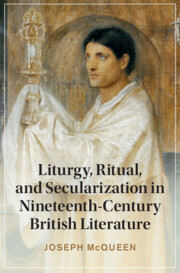Book contents
- Liturgy, Ritual, and Secularization in Nineteenth-Century British Literature
- Cambridge Studies in Nineteenth-Century Literature and Culture
- Liturgy, Ritual, and Secularization in Nineteenth-Century British Literature
- Copyright page
- Dedication
- Contents
- Figures
- Acknowledgments
- Introduction
- Chapter 1 Mediating the Modern
- Chapter 2 Memory and Revolution
- Chapter 3 Tractarian Liturgies
- Chapter 4 Realist Liturgies
- Chapter 5 Liturgical Aestheticism
- Chapter 6 Against Immanence
- Epilogue
- Notes
- Bibliography
- Index
- Cambridge Studies in Nineteenth-Century Literature and Culture
Chapter 2 - Memory and Revolution
Ritual Time in Wordsworth’s Prelude
Published online by Cambridge University Press: 14 November 2024
- Liturgy, Ritual, and Secularization in Nineteenth-Century British Literature
- Cambridge Studies in Nineteenth-Century Literature and Culture
- Liturgy, Ritual, and Secularization in Nineteenth-Century British Literature
- Copyright page
- Dedication
- Contents
- Figures
- Acknowledgments
- Introduction
- Chapter 1 Mediating the Modern
- Chapter 2 Memory and Revolution
- Chapter 3 Tractarian Liturgies
- Chapter 4 Realist Liturgies
- Chapter 5 Liturgical Aestheticism
- Chapter 6 Against Immanence
- Epilogue
- Notes
- Bibliography
- Index
- Cambridge Studies in Nineteenth-Century Literature and Culture
Summary
In The Prelude (1805/1850), Wordsworth reimagines time through the ritual calendar and festivals of revolutionary France. The Revolution’s rituals, moreover, complicate the common notion that Wordsworth retreats from politics into poetry. By way of ritual, Wordsworth enters what Walter Benjamin calls now-time or higher time, moments in which the past – via memory – becomes simultaneous with the present. Such now-times allow Wordsworth to juxtapose, on the one hand, his own past calling to a poetic vocation with, on the other hand, the Revolution’s founding vocation to bring liberty. In that juxtaposition, Wordsworth’s own faithfulness to his poetic calling tacitly critiques the Revolution’s infidelity to its origins. The higher time of ritual, then, mediates between Wordsworthian memory and revolutionary history. Wordsworth provides foundations for many Victorian liturgies. His sacralization of material reality, his resistance to the market’s dehumanizing rituals, his imbrication of memory and higher time – each of these undergoes further elaboration as the century unfolds.
Keywords
- Type
- Chapter
- Information
- Publisher: Cambridge University PressPrint publication year: 2024

